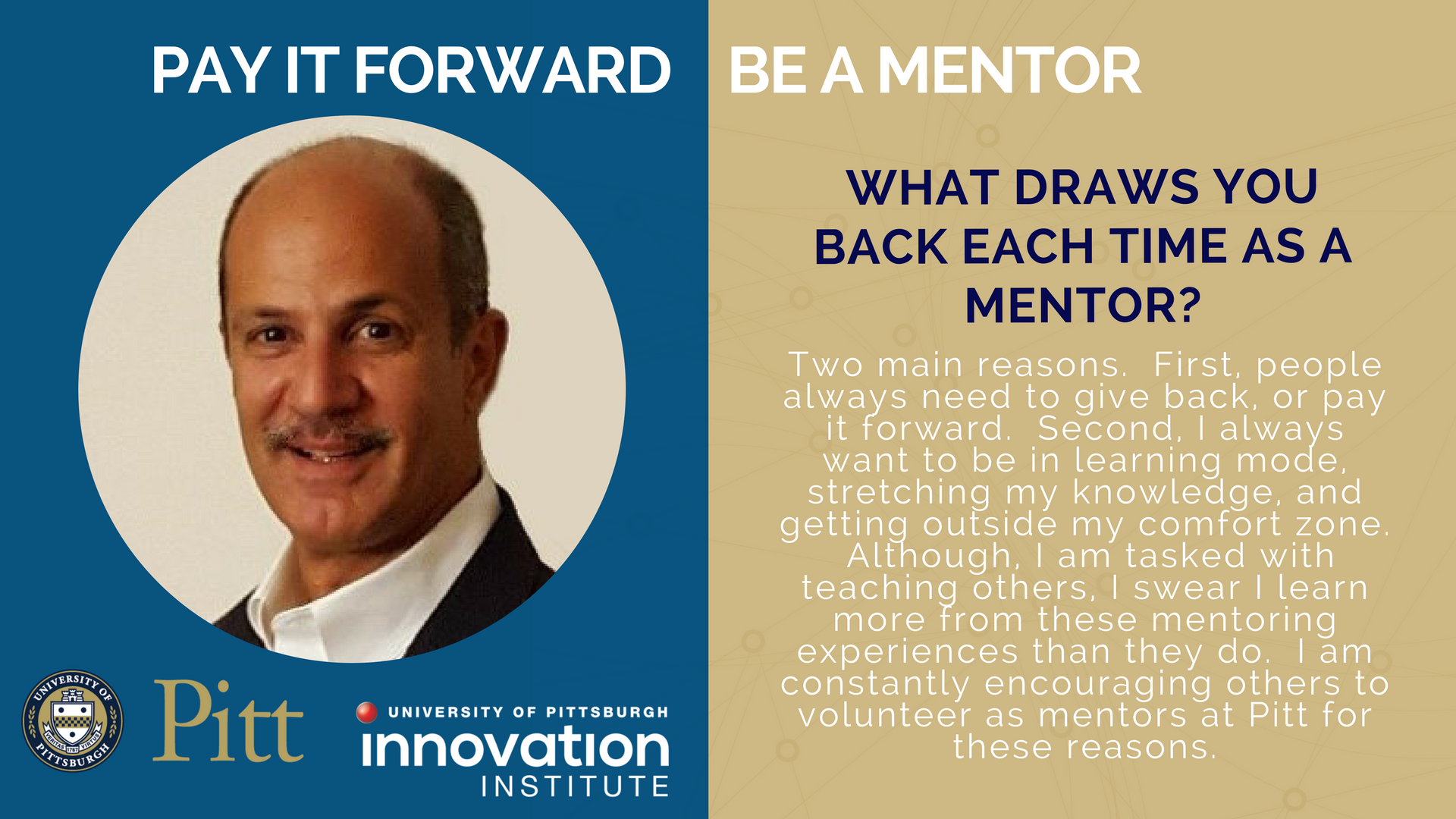Mentoring at Pitt can be a rewarding experience both for the faculty/student entrepreneur and for the mentor who plays an often transformative role in helping translate a potentially world-changing idea or research discovery into a product or service that makes a difference in people's lives.

We welcome Pitt alum Mark Chiodo, (BA ’84 and MBA ’85) to share some of his insight on mentoring at Pitt. Mark is an experienced CFO and consultant currently serving as the Client Controller for HM Health Solutions. He has mentored 15 innovation teams at Pitt across an array of Innovation Institute programs and courses, including the Blast Furnace student accelerator, First Gear commercialization program, the Management Simulation MBA capstone course at the Katz Graduate School of Business, and the Institute for Entrepreneurial Excellence's Entrepreneurial Fellows program.
Do you have a mentor that has helped guide your career path?
No. I never had a formal mentor, although I would have liked one. I do however, get people’s opinions before any and all important decisions. The people I call on always changes, depending on the situation.
What was their best advice?
The best advice comes from my wife. She always reminds me that you should never tell people what to do. Tell them what has worked for you in the past, give them things to think about, and then let them decide for themselves. This resonates with me because I don’t like to be told what to do personally, but appreciate input on how to think about particular problems and what to consider. As a result, I try to help others by bouncing ideas off of them based on the information they share with me.
How does your advice vary based on the program you mentor?
It’s similar – I focus on what ways I may best impact each team, just as I would in a new consulting assignment. I have a few financial skills and many people aren’t comfortable with numbers and thinking in financial terms. So helping them all with the financial aspects of their projects is consistent across the various groups.
Before my first mentoring assignment, I anticipated that I would spend all my time answering financial questions, but it so often begins elsewhere. In one case, it was helping develop the team’s sales process. More often than not, the focus is on broad business issues. This is a big part of why I enjoy participating.
What do you find most enjoyable about working with a University team as opposed to an existing company?
They listen more (way more) than my typical consulting client. They do want to know what I think and that feels good.
Is there a piece of advice you make sure you give to all those teams?
Surprisingly no. With each team, I customize my approach based on what they want, and what I think they need the most. That guarantees that each experience is different.
Although I don't use this with everyone, the one comment I have used most often in my career is one that I came up with years ago. "You are living in the future of your past decisions." In other words, what is going on today is not an accident or coincidence. Today is the outcome of the choices you made in the past, leading you on a very specific path.
You make many conscious decisions in the past, and the present is the realization of the future of those past decisions. For example, in the First Gear program with the use of the Business Model Canvas, you come up with your product design as an outgrowth of doing customer discovery. This First Gear approach forces you to think through what your product decisions today will do to affect your future.
What draws you back each time as a mentor?
Two main reasons. First, people always need to give back, or pay it forward. Second, I always want to be in learning mode, stretching my knowledge, and getting outside my comfort zone. Although, I am tasked with teaching others, I swear I learn more from these mentoring experiences than they do. I am constantly encouraging others to volunteer as mentors at Pitt for these reasons.
What question should I have asked, that I didn’t?
The question I would ask is "What is the most interesting observation you have had in your mentoring experiences?" My answer is that with many startups, failure IS an option. If one is an entrepreneur, it will happen. It needs to be embraced. It should not be feared. One needs to learn from it. In corporate America, they have a naive approach that if you have a failure on your resume, there is something wrong with you. I am fascinated as to how these two views coexist. In fact, I have seen several people in the course of my career experience far more growth and learning through a failure than from a success.
Interested in serving as a Pitt Innovation Institute mentor, click below:
